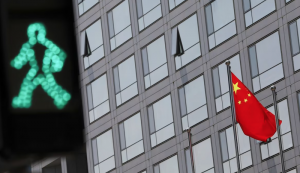China’s securities regulator said on Friday it is confident it will reach an agreement with US counterparts on securities supervision, after New York-listed Chinese stocks tumbled as the first to be potentially delisted were named.
Earlier this week, the US Securities Exchange Commission (SEC) identified five Chinese companies that will be delisted by 2024 if they do not provide access to audit documents, according to a March 8 post on its official website.
They are fast-food giant Yum China, biotech groups BeiGene, Zai Lab and HutchMed, and technology company ACM Research. The announcement triggered a sell-off in the Chinese stocks on Thursday.
Nasdaq-listed ACM closed down 22%, while Zai Lab dropped 9%. HutchMed fell 6.5% and BeiGene fell 6%, also on the Nasdaq. NYSE-listed Yum dropped more than 10%. The Nasdaq Golden Dragon index closed down 10%.
Read more: Chinese Stocks Delisting From the US: 25 On the Brink
The SEC estimated that 273 registrants might be identified as part of its review of registrants in calendar year 2020 under the Holding Foreign Companies Accountable Act (HFCAA).
In Hong Kong on Friday, HutchMed dropped more than 11% and Yum China stock fell 7.5% in mid-afternoon trading, while BeiGene and Zai Lab dipped about 6%. The broader Hang Seng Index fell less than 0.7%.
“Yum China previously disclosed that it expected to be so identified,” Yum said in a Hong Kong stock exchange filing on Friday. “The company will continue to monitor market developments and evaluate all strategic options.”
Zai Lab said in a filing on Friday that it was “evaluating, designing, and implementing additional business processes and control changes to meet the requirements of the HFCAA”.
The company said that would “enable us to engage an independent public accounting firm that satisfies the PCAOB inspection requirements”, referring to the Public Company Accounting Oversight Board, the US audit regulator.
Why will Chinese stocks be delisted?
Since the Sarbanes-Oxley Act was passed in 2002, the US has demanded complete access to the books of any foreign company listed on a US exchange.
Every country except China has cooperated, and after a series of discussions over numerous years failed, the US Congress passed the HFCCA, which compelled the SEC to delist the Chinese stocks any company that does not comply.
The auditing dispute puts hundreds of billions of dollars of US investments at stake.
In the note posted on its official WeChat page, the China Securities Regulatory Commission (CSRC) said that together with the Ministry of Finance, it has continued to communicate with the PCAOB.
The CSRC said talks had made “positive progress” but added that it firmly opposes the “politicising of securities supervision”.
The PCAOB’s longstanding position is that the attitude taken by Chinese authorities impedes its ability to oversee US-registered audit firms in mainland China and Hong Kong.
“Specifically, these positions impair our ability to conduct inspections and investigations of the audits of public companies with China-based operations and whether we will obtain access remains an open issue,” the PCAOB has said.
“This affects our ability to oversee audit work on behalf of investors in US capital markets,” it added.
- Reuters, with additional editing by George Russell
READ MORE:
25 Chinese Stocks On The Brink Of Delisting From The US
In Numbers: Possible Impact of China Stocks Delistings
Investors Brace For Delisting of US-Listed China Stocks
























